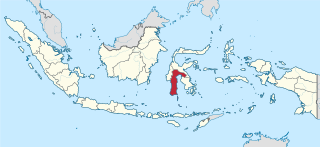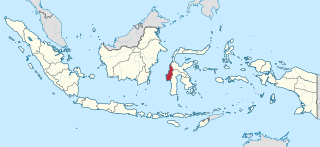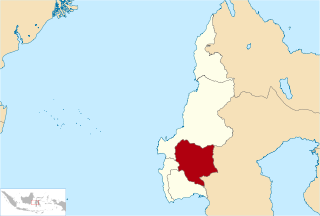Related Research Articles

Buginese or Bugis is a language spoken by about 4 million people mainly in the southern part of Sulawesi, Indonesia.

South Sulawesi is a province in the southern peninsula of Sulawesi, Indonesia. The Selayar Islands archipelago to the south of Sulawesi is also part of the province. The capital and largest city is Makassar. The province is bordered by Central Sulawesi and West Sulawesi to the north, the Gulf of Bone and Southeast Sulawesi to the east, Makassar Strait to the west, and Flores Sea to the south.

West Sulawesi is a province of Indonesia. It borders the provinces of South Sulawesi and Central Sulawesi to the east, Makassar Strait to the west, and the Pacific Ocean to the south. The province also shares maritime borders with East Kalimantan and South Kalimantan to the west and West Nusa Tenggara to the south. It is located on the western side of Sulawesi island. It covers a land area of 17,152.99 km2, and its capital is the town of Mamuju. The 2010 Census recorded a population of 1,158,651, while that in 2020 recorded 1,419,228; the official estimate as at mid 2023 was 1,481,077.

Majene is the administrative capital of Majene Regency and it is located in the Indonesian province of West Sulawesi.

Polewali Mandar is one of the five regencies in West Sulawesi province of Indonesia. It borders on the regencies of Mamasa in the North, Majene in the West and Pinrang regency of South Sulawesi in the East. It covers an area of 2,074.76 km2 and had a population of 396,120 at the 2010 Census and 478,534 at the 2020 Census; the official estimate as at mid 2023 was 495,371. The regency is inhabited by various ethnic groups such as the Mandar, Buginese, Javanese and Toraja.

The Mandarese are an ethnic group in the Indonesian province of West Sulawesi in Sulawesi. The Mandar language belongs to the Northern subgroup of the South Sulawesi languages group of the Malayo-Polynesian branch of the Austronesian language family. The closest language to Mandar is the Toraja-Sa'dan language.

Majene Regency is one of the six regencies which comprise West Sulawesi Province, Indonesia, on the island of Sulawesi. The town of Majene in the far south of the regency is the administrative capital, and consists of two administrative districts - Banggae and Banggae Timur. The population of Majene Regency was 151,197 at the 2010 Census and 174,407 at the 2020 Census; the official estimate as at mid 2023 was 181,360.

Mamasa Regency is one of the six regencies that make up the West Sulawesi Province, Indonesia, on the island of Sulawesi. It covers a land area of 3,005.88 km2. The population was 140,082 at the 2010 Census and 163,383 at the 2020 Census; the official estimate as at mid 2023 was 170,354. Its capital is the town of Mamasa. The Mamasa people - which is a sub-group of the Toraja people - form the most common ethnic group.
Bambam is an Austronesian language of West Sulawesi, Indonesia. It is spoken in the Mambi and Tabang districts of Mamasa Regency, and in the Matangnga district of Polewali Mandar Regency. Together with Aralle-Tabulahan, Ulumanda', Pannei and Dakka, Bambam belongs to the Pitu Ulunna Salu languages, which form a subbranch within the Northern branch of the South Sulawesi subgroup.
Taeʼ is a language spoken in South Sulawesi, Indonesia. It belongs to the Austronesian language family and is one of the languages of the ten tribes that inhabit the Tana Luwu region of South Sulawesi. The Taeʼ language is used by most of the inhabitants of the three regencies of Tana Luwu, and the city of Palopo. Taeʼ is part of the South Sulawesi group of languages. It is closely related to Toraja, and more distantly to Mandar, Massenrempulu, and Mamuju. Taeʼ is used as a lingua franca from south of the border with Buriko Wajo Regency to Malili East Luwu Regency, as well as in Tana Toraja and Massenrempulu.
Mamasa is an Austronesian language spoken in West Sulawesi, Indonesia. This language is the native language of the Mamasa people which is related to the Toraja people.
Dakka is an endangered Austronesian language of Sulawesi, Indonesia. It is spoken in the Wonomulyo district of Polewali Mandar Regency, and belongs to the Northern branch of the South Sulawesi subgroup.
The South Sulawesi expeditions of 1905, which included the Third Bone War and the Gowa War, were undertaken by the Royal Netherlands East Indies Army (KNIL) to force the states of south Sulawesi (Celebes) to sign the Korte Verklaring, the standard agreement whereby a native Indonesian ruler agreed to accept Dutch sovereignty. According to certain Dutch historians, the expeditions were an "obligation", because the Dutch had responsibility for law and order. One Indonesian historian has argued that it was actually strategic: that south Sulawesi was the "key" to controlling the so-called Great East. There was also an economic motive: to extend the tax-collecting powers of the government of Sulawesi. The expeditions received the imprimatur of the Governor of Sulawesi, Alexander Kroesen, in a letter dated 11 February 1904.
Pattae' is the language spoken by the Pattae' people, an ethnic group living along the coast in the eastern part of Polewali Mandar Regency, West Sulawesi, Indonesia. Based on lexical similarity and mutual intelligibility, Pattae' has been classified as a dialect of the Mamasa language, but native speakers consider it a separate language.

The Greater Sunda Islands are four tropical islands situated within the Indonesian Archipelago, in the Pacific Ocean. The islands, Borneo, Java, Sulawesi and Sumatra, are internationally recognised for their ecological diversity and rich culture. Together with the Lesser Sunda Islands to their southeast, they comprise the archipelago known as the Sunda Islands.
The Northern South Sulawesi languages are a subgroup of the South Sulawesi languages in the Austronesian language family. They are spoken in an area that stretches from the western peninsula of Sulawesi to the Gulf of Bone. Its most prominent members are Mandar and Toraja.
Andi Depu was an Indonesian revolutionary and leader of the Mandarese people against the Dutch during the Indonesian National Revolution. She was the first female high king or Maharani in Indonesia.

The Mamasa is an ethnic group residing in Mamasa Regency, West Sulawesi. The Mamasa community is known in districts in Mamasa Regency. The Mamasa people are part of the Toraja sub-people. Mamasa language is similar to Toraja language. The Mamasa people are often referred to as the Toraja Mamasa people.
References
- 1 2 Mandar at Ethnologue (26th ed., 2023)
